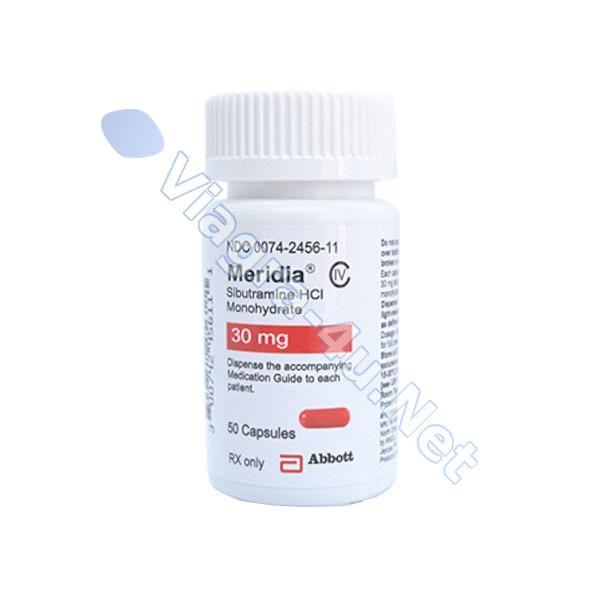
Meridia Brand (Sibutramine) 30mg is a very popular diet pill that is used to help men and women with weight loss issues. The people who seem to benefit the most from Meridia Brand (Sibutramine) 30mg are those who are severely obese. People who are under 16 years of age or pregnant and nursing women should not use Meridia Brand 30mg.
Meridia Brand (Sibutramine) 30mg is indicated for the management of obesity, including weight loss and maintenance of weight loss, and should be used in conjunction with a reduced calorie diet. Sibutramine is recommended for obese patients with an initial body mass index ≥ 30 kg/m2, or ≥ 27 kg/m2 in the presence of other risk factors (e.g., diabetes, dyslipidemia, controlled hypertension).
Meridia Brand (Sibutramine) 30mg assists with weight-loss by altering neurotransmitters within the brain. Neurotransmitters are chemicals that are produced and released by nerves in order to communicate with other nerves. Released neurotransmitters may attach to other nerves or they may be taken up again by the nerves that release them, a process termed reuptake. Sibutramine blocks the reuptake of the neurotransmitters dopamine, norepinephrine, and serotonin. Blocking the reuptake of neurotransmitters alters the balance of neurotransmitters within the nerve cells and thereby affect nerve function and interaction.
Patients taking SIBUTRAMINE may achieve a 5-10% reduction from their baseline weight. Additionally, sibutramine-assisted weight loss has been accompanied by improvement in blood lipids (e.g, cholesterol). Sibutramine was approved by the FDA in 1997.
For a starting dose of Meridia, the recommended amount would be 10 mg once a day. It could be taken with or without food. Now, if in any case, the weight loss is insufficient, the dose could be titrated after around four weeks for a total of about 15 mg once a day. Be reminded, though, that doses more than 15-20 mg a day are not recommended. 5 mg doses could, however, be administered if the patient is unable to tolerate 10 mg doses. As for the dose titration, changes in the heart rate and blood pressure must be considered and monitored.
Generally, Meridia SIBUTRAMINE is tolerable. Some of the more commonly observed side effects would include a dry mouth, constipation and insomnia. There have also been reports that some patients had convulsions. However, these were the patients who already had predisposing factors for seizures. Another reported side effect would be ecchymosis or bleeding, which has been studied to be because of the possible effects of Meridia on platelet function, which is a result of the drug's effect on serotonin uptake. Some other side effects are flatulence, diarrhea, peripheral oedema, gastroenteritis, agitation, arthritis, hypertonia as well as some menstrual disorders.
Sibutramine must be converted in the liver to its active form. This conversion is inhibited by ketoconazole (Nizoral), cimetidine (Tagamet) and erythromycin (Erytab, Eryc, Ilosone), and use of these drugs can result in decreased conversion and effectiveness of SIBUTRAMINE. Several other drugs may have a similar effect. These other drugs include clarithromycin (Biaxin), danazol (Danocrine), diltiazem (Cardizem, Tiazac, Dilacor), fluconazole (Diflucan), fluoxetine (Prozac), itraconazole (Sporanox), propoxyphene (Darvon), troleandomycin (Tao) and verapamil (Verelan, Covera, Calan, Isoptin).
In patients receiving one of the drugs from a class of drugs known as selective serotonin reuptake inhibitors (SSRIs), for example, fluoxetine (Prozac), fluvoxamine (Luvox), paroxetine (Paxil), sertraline (Zoloft) at the same time as monoamine oxidase inhibitor drugs (MAO inhibitors), there have been reports of serious reactions (serotonin syndrome). The serotonin syndrome may include one or more of the following: agitation, anxiety, dizziness, confusion, excessive sweating, disorientation, painful joints, vomiting, hyperexcitement, fever, loss of coordination, loss of consciousness, shivering, fast heart rate, tremor, and weakness.
As discussed previously, sibutramine, like the SSRIs, blocks the reuptake of serotonin and may also cause the serotonin syndrome. Therefore, sibutramine should not be used with MAO inhibitors, and there should be at least a 2-week interval between stopping an MAO inhibitor and starting sibutramine. Similarly, there should be at least a 2-week interval after stopping sibutramine and starting an MAO inhibitor.
Serotonin syndrome also has been reported with the use of SSRIs at the same time as medications used for migraines such as sumatriptan (Imitrex), zolmitriptan (Zomig) and dihydroergotamine (DHE), as well as dextromethorphan (found in many cough medications such as Robitussin-DM), meperidine (Demerol), pentazocine (Talwin) and fentanyl (Duragesic), or lithium (Eskalith). Therefore, these drugs should not be used with sibutramine.
Store Meridia Brand (Sibutramine) 30mg at room temperature between 68-77 degrees F (20-25 degrees C) away from light and moisture. Do not store the drugs in the bathroom. Keep all drugs away from reach of children and pets.